|
Cover
Story
Political Bickering:
Taking us Nowhere
SHAMIM
AHSAN
 On
the part of the government LGRD minister Abdul Mannan Bhuiyan
rejected the allegation made by Hasina and Jalil. He argued
that the government could not do anything that might upset
the stability of the country. "They have blamed the government
out of emotion", he added and advised the AL to refrain
from such baseless accusations, which would hamper the investigation
process. On
the part of the government LGRD minister Abdul Mannan Bhuiyan
rejected the allegation made by Hasina and Jalil. He argued
that the government could not do anything that might upset
the stability of the country. "They have blamed the government
out of emotion", he added and advised the AL to refrain
from such baseless accusations, which would hamper the investigation
process.
Accusing
the political opponent for anything bad has been a long established
culture among our politicians. On the first couple of days
after the deadliest ever grenade attack on August 21 many
hoped to see an end to that tradition when people cutting
across all political camps, beliefs and ideologies condemned
the heinous crime in unison. The almost unanimous reaction
was that this attack was not just against a group of individuals
but an attack on the sovereignty, democracy and secular values
of the country. They all demanded quick arrest of "the
enemy of the country". The government, apparently shocked,
vowed to hunt down the perpetrators of such a gruesome crime.
But
soon the notes of discord could be heard. In an interview
with the BBC within a couple of hours, Hasina said the attack
was made with the encouragement of the government. On the
part of the government LGRD minister Abdul Mannan Bhuiyan
rejected the allegation made by Hasina and Jalil. He argued
that the government could not do anything that might upset
the stability of the country. "They have blamed the government
out of emotion", he added and advised the AL to refrain
from such baseless accusations, which would hamper the investigation
process.
That
is of course the last thing on AL's mind and it has continued
to blame the BNP for the attack. It however widened its list
of accused by including "the fundamentalist forces"
(clearly indicating Jamaat-e-Islami) along with the BNP. They
demanded, moreover, the resignation of the government. In
response to AL's allegation, the BNP preferred to take the
defensive stand, at least for the time being by proclaiming
its innocence. But very soon the attacking tone asserted itself
when they accused AL of attacking their own rally. They of
course had their own arguments to make such a claim. AL, they
said, had done it to destabilise the country and discredit
the government only to grab the power. So that they do not
look as if going to power was their only or main target. AL,
on the other hand, has explained why they were asking the
government to quit. Reasons the AL cited include the formation
of a judicial investigation commission, which it said was
a cover up, as investigation under Justice Joynul Abedin could
not be neutral for he had been actively involved in the BNP
politics in the past. Other points of contention include the
delay in launching the investigation, letting the spot of
occurrence go unprotected that allowed very crucial evidence
to go missing and keeping the truck used as podium in police
custody.
 And
since then the AL and BNP have got locked in the same old
practice of accusation and counter accusation, each attacking
the opponent with greater gusto and coming up with new allegations
every day. In the process, both the parties are circulating
somewhat far-fetched theories. The quarrel between the two
parties has been taken up by a large contingent of pro-BNP
and pro-AL intellectuals. And
since then the AL and BNP have got locked in the same old
practice of accusation and counter accusation, each attacking
the opponent with greater gusto and coming up with new allegations
every day. In the process, both the parties are circulating
somewhat far-fetched theories. The quarrel between the two
parties has been taken up by a large contingent of pro-BNP
and pro-AL intellectuals.
The casualty
of this perpetual feud is of course an impartial investigation.
The initial shock subsided within a few days of the bloodiest
grenade attack and the bitterness and enmity between the two
parties only intensified. PM Khaleda Zia however made an attempt
to make up by asking to meet with Sheikh Hasina and later
wanted to write a letter. But the AL refused to bend.
Thousands
of AL activists and supporters kept a day-long vigil at various
points in Dhanmandi to prevent Khaleda Zia from getting to
Shudha Sadan, Hasina's residence. AL accused the present government
of never taking the issue of Hasina's security seriously.
AL at the fag end of its term in office made a law for the
security of Bangabandhu's last two family members --Sheikh
Hasina and her younger sister Sheikh Rehana. After BNP came
to power in 2001 it scrapped the law ignoring AL's plea. Throughout
the last 3 years of BNP's rule there have been 4 attacks on
Hasina in different parts of the country. Recently Hasina
received a death threat over telephone when she was in Turkey
to attend the D-8 conference. But when the AL deputies raised
the issue in the Parliament PM Khaleda Zia scoffed at the
seriousness of the threat. All this has convinced the AL that
the BNP isn't serious about Hasina's safety and Khaleda's
proposed visit was only for show.
The attack
has certainly sparked much heat in the political scene. The
AL has been lobbying with leftist parties as well as Jatiya
Party (Ershad), JSD (Jatya Shamajtantrik Dal) and Workers
Party to forge a broad-based opposition alliance and launch
a movement to oust the BNP government. BNP in response to
the demand of its resignation is accusing the AL of exploiting
the August 21 attack to get to power. Hard-liners of the BNP
are saying that the attack was propelled by AL, referring
to the fact that none of the grenades landed on the truck
where Hasina along with the entire front line AL leaders were
standing. They also argued that even when there had been a
number of terrible bomb attacks during the AL regime the party
did not step down.
In
the last seven years we have witnessed a series of bomb blasts
-- Udichi, Ramna, Mymensingh cinema halls, Narayanganj AL
office, the Shahajalal shrine in Sylhet and Paltan Maidan.
Some political leaders discovered a pattern in the attacks:
in most cases secular forces and those who believe in culture,
tradition and democratic values are the target of the attacks.
Some suspect a plot by international Muslim extremist groups;
some are hinting the association of ISI (Inter Services Intelligence);
while Jamaat leader Matiur Rahman Nizami believes it is the
"well known enemies of Islam" who are masterminding,
through various organisations, to carry out such brutal murders.
 While
such speculations can go on indefinitely, the perpetrators
of the crimes remain unmasked and the threat to security,
to democracy and secular thinking, remains. The fact that
both the AL and BNP governments have failed to pursue any
of the bomb cases can mean one of two things: either they
are insincere or else they are incapable of making any serious
headway into the crimes. Some political analysts have observed
that had Khaleda been able to visit Hasina it could very well
have been the beginning of a novel political tradition. Provided,
of course, that both the government and the opposition created
an environment of co-operation and tolerance, which are non-existent
in our political culture. While
such speculations can go on indefinitely, the perpetrators
of the crimes remain unmasked and the threat to security,
to democracy and secular thinking, remains. The fact that
both the AL and BNP governments have failed to pursue any
of the bomb cases can mean one of two things: either they
are insincere or else they are incapable of making any serious
headway into the crimes. Some political analysts have observed
that had Khaleda been able to visit Hasina it could very well
have been the beginning of a novel political tradition. Provided,
of course, that both the government and the opposition created
an environment of co-operation and tolerance, which are non-existent
in our political culture.
"I
believe some extremist group, which has professional hands
under their command, is behind the attack," says Maj
Gen Syed Md Ibrahim, a well-known security analyst. "The
fact that the grenades didn't hit the truck doesn't necessarily
mean the attackers are unprofessional. May be the truck wasn't
their target and if you have to make sure that not a single
grenade would hit the truck even then you need professional
hands," he argues.
So will
the case be solved? Maj Gen Syed Ibrahim says it depends more
on political will than anything else. "I am hopeful the
case will be resolved, if, there is an understanding among
the political parties that all of them will sincerely assist
the investigation process," he says. It's a big if, though.
Much responsibility rests on the government's shoulder as
they control the investigating agencies. But does our police
department have the skill and expertise to handle such a case?
"Well, that is the reason why the Interpol and FBI are
here. Besides, it is not the lack of talent but the lack of
environment that possibly restricts the police to perform
their level best," he says.
Ibrahim
puts great emphasis on the cooperation of different political
parties to unearth the grenade attack incident. He wants to
give Khaleda credit for her intended visit to Hasina's house.
"In fact Khaleda Zia should have met Hasina much earlier
than she attempted without waiting for protocol and affirmative
response from Hasina. And Hasina should also have allowed
Khaleda in. Things could change in a big way for the better,
of course," he concludes.
Searching
for Clues
MUSTAFA
ZAMAN
 In
the absence of information on the Augusts 21 grenade attack
on an Awami League meeting, speculations have run rampant.
Not only are ordinary citizens letting their imagination run
wild with various conspiracy theories, the government as well
as the opposition are adding fuel to the fire by accusing
each other of having a hand in the attack. The constant mudslinging
and finger pointing by the ruling coalition and leaders of
the opposition have only lead to the further muddying of the
real issues. In
the absence of information on the Augusts 21 grenade attack
on an Awami League meeting, speculations have run rampant.
Not only are ordinary citizens letting their imagination run
wild with various conspiracy theories, the government as well
as the opposition are adding fuel to the fire by accusing
each other of having a hand in the attack. The constant mudslinging
and finger pointing by the ruling coalition and leaders of
the opposition have only lead to the further muddying of the
real issues.
 The
post-attack state of affairs is also marked by a glut of theories
put forward by various columnists. Sifting through the spreads
run by local dailies is another head-churning journey. Many
of the columns are riddled with assumptions. The chasm in
the national polity surfaces in the printed words as well.
The pro-AL pundits as usual have done their bit by lambasting
the coalition and laying the blame straight at the door of
the fundamentalists. Meanwhile the pro-BNP theorists somehow
managed to point fingers to the AL while its link to the country's
biggest neighbour remains a recurring motif in the dailies
that steep considerably to the right. The
post-attack state of affairs is also marked by a glut of theories
put forward by various columnists. Sifting through the spreads
run by local dailies is another head-churning journey. Many
of the columns are riddled with assumptions. The chasm in
the national polity surfaces in the printed words as well.
The pro-AL pundits as usual have done their bit by lambasting
the coalition and laying the blame straight at the door of
the fundamentalists. Meanwhile the pro-BNP theorists somehow
managed to point fingers to the AL while its link to the country's
biggest neighbour remains a recurring motif in the dailies
that steep considerably to the right.
Moshiul
Alam, a journalist and one of the Deputy Editors of the Daily
Prothom Alo, is constantly being badgered by two of his friends
to oblige them with information on who carried out the heinous
attack on AL meeting. "Being a journalist, I too, am
in the dark. The government seems to be harbouring the same
colonial tendency to hide information," exclaims Alam.
"Every time we ask the relevant agencies to update us
on the August 21 investigation, we are told that for the sake
of the ongoing investigation they cannot leak any information,"
Alam adds. His friends are members of the two archenemies
that make up the bi-polar political matrix, namely BNP and
AL. Both of his friends are being short-changed by the parties
they belong to as well as the state they live in with regards
to objective information.
 After
the August 21 attack, the Criminal Investigation Department
(CID) was, as a matter of course, in charge of the investigation.
Then came the Interpol to lend a hand and Federal Bureau of
Investigation (FBI) followed. According to newspaper reports,
the FBI arrived on their own without any official invitation,
flouting national security policies. Interpol arrived in accordance
with the government's wish. They sent two of their experts,
Jeffry Eyles, an expert on public safety and terrorism affairs
and Jecqueline Pullums, a US analyst of civilian terrorism
on August 29. Two other interpol experts -- American Marash
Vucilaj, a specialist on public safety, and Chinese Xin Hu,
an expert on terrorism flew in on Sept 1 to join his colleagues.
Pullums left the country on SEP 3 with video footage and photos. After
the August 21 attack, the Criminal Investigation Department
(CID) was, as a matter of course, in charge of the investigation.
Then came the Interpol to lend a hand and Federal Bureau of
Investigation (FBI) followed. According to newspaper reports,
the FBI arrived on their own without any official invitation,
flouting national security policies. Interpol arrived in accordance
with the government's wish. They sent two of their experts,
Jeffry Eyles, an expert on public safety and terrorism affairs
and Jecqueline Pullums, a US analyst of civilian terrorism
on August 29. Two other interpol experts -- American Marash
Vucilaj, a specialist on public safety, and Chinese Xin Hu,
an expert on terrorism flew in on Sept 1 to join his colleagues.
Pullums left the country on SEP 3 with video footage and photos.
Interpol
has come to assist the ongoing investigation, their job is
to help the Bangladeshi agencies gather evidence. However,
in the end, it was Interpol who was calling the shots. By
September 6, they were through scanning the video footage
and a list of 14 suspects. Then began the hunt for a seasoned
criminal named Mukul, whose presence at the AL rally has raised
a lot of questions. However, RAB (Rapid Action Battalion)
operations in seven areas in the city on September 6 resulted
in the rounding up of 6 men connected to other criminal activities.
None from the list of 14 were arrested.
 The
next step for the Interpol was to record the mobile phones
of the AL leaders who were present on the spot the day of
the attack. It was at this point newspaper reports revealed
that Interpol was giving directions to six intelligence agencies
in Bangladesh. The
next step for the Interpol was to record the mobile phones
of the AL leaders who were present on the spot the day of
the attack. It was at this point newspaper reports revealed
that Interpol was giving directions to six intelligence agencies
in Bangladesh.
Gibson
Wilson arrived on September 1. The forensic expert and special
agent of the FBI, an intelligence outfit of the US government,
appeared in the rather muddy scene. Interestingly, the CID,
Bangladesh government's intelligent unit, had no inkling of
his arrival. Wilson went to inspect the bullet-ridden Mercedes
sports utility car of the former Prime Minister and the leader
of the opposition Sheikh Hasina. The CID officials came down
to Shudha Sadan, opposition leader's residence at Dhanmondi,
to have themselves introduced to the foreign expert.
Regarding
Gibson's arrival, the only clear answer came from the Minister
for Industry and the emir of Jamaat-e-Islami, Matiur Rahman
Nizami, the chief of one of the major stakeholders in the
coalition government. In a press conference of his party,
he confirmed that the FBI expert came with prior knowledge
of the government.
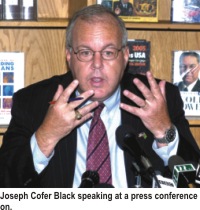 In
the face of the series of bomb attacks, it was the Information
Minister who said that Bangladesh would not seek assistance
of any international organisation other than Interpol. While
India as well as the US stood ready to offer help, the minister
set aside any possibility for bilateral assistance by saying,
"an Interpol investigation covers probe assistance from
181 of its member country." In
the face of the series of bomb attacks, it was the Information
Minister who said that Bangladesh would not seek assistance
of any international organisation other than Interpol. While
India as well as the US stood ready to offer help, the minister
set aside any possibility for bilateral assistance by saying,
"an Interpol investigation covers probe assistance from
181 of its member country."
However,
the news of arrival of Joseph Cofer Black, the Senate Department
coordinator on anti terrorism helped clear the ambiguity that
followed the arrival of the FBI agent. Bangladesh had already
signed many treaties with the US and is now on its way to
sign another major protocol.
Although
many experts revealed their surprise about Black's visit,
the stage was already set for his arrival. In the media his
visit was seen as a follow-up of US Assistant Secretary of
State Christina Rocca's visit in May, when she stated, "Bangladesh
is going off its tolerant track record", and Congressman
Joseph Crowley's in January who said, " Intolerance is
taking hold of some parts of Bangladesh." Black was here
to pave the way to the signing of the Terrorist Interdiction
Program (TIP) and a memorandum of intent (MoI) signed between
Washington and Dhaka during Rocca's visit.
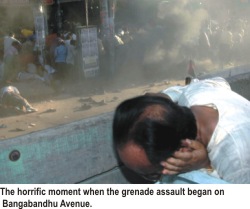 While
Foreign Minister nullified AL's plea for having a UN or Commonwealth-run
probe, as "unrealistic and impractical", the US
Ambassador in Dhaka Harry K Thomas' enthusiastic offer to
lend a hand prefigured the arrival of US assistance. In a
meeting with the Rural Development and and Co-operative Minister
Abdul Mannan Bhuiyan he expressed the US' readiness to send
experts. Bhuiyan, also the secretary general of the BNP, met
the envoy at his Secretariet office and said on August 31,
"If the Interpol suggests that we should seek further
assistance from any other body, we will act on that and in
that case we may seek US assistance as well." While
Foreign Minister nullified AL's plea for having a UN or Commonwealth-run
probe, as "unrealistic and impractical", the US
Ambassador in Dhaka Harry K Thomas' enthusiastic offer to
lend a hand prefigured the arrival of US assistance. In a
meeting with the Rural Development and and Co-operative Minister
Abdul Mannan Bhuiyan he expressed the US' readiness to send
experts. Bhuiyan, also the secretary general of the BNP, met
the envoy at his Secretariet office and said on August 31,
"If the Interpol suggests that we should seek further
assistance from any other body, we will act on that and in
that case we may seek US assistance as well."
Black,
who has had a long stint with the Central Intelligence Agency
(CIA) and is responsible for US efforts to improve counter-terrorism
co-operation with foreign governments, arrived on Sepember
5. On the second day, before leaving for Nepal, he attended
a press conference, where he and the Foreign Minister M Morshed
Khan hinted at the signing of counter-terror protocol in the
future. While Khan said that Bangladesh would consider any
offer from the US concerning the fight against terrorism,
Black left a whole contingent of newsmen wondering about US's
stand on India's claim that there are "terrorists camps"
in Bangladesh. All questions concerning India's claim remained
unanswered. However, Black assured that intelligent agencies
of Bangladesh would receive both training and equipment from
the US after the signing of the said protocol.
It is
common knowledge that the law enforcing agencies in Bangladesh
lacks expertise in forensic as well as in anti-terrorism.
The Chief of police himself has admitted to their limitations
in investigating cases of bomb blasts. He said that the Bangladesh
police is deficient in expertise in identifying and defusing
explosives and that they are yet to develop ballistic and
forensic experts.
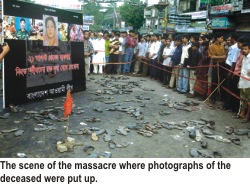 Intervention
by international experts was inevitable. However, that too
does not promise much. In fact, experts believe that the involvement
of the FBI fails to trigger hope as they have utterly failed
to secure their own homeland in the pre-9/11 regime. Brig
Gen (Retd) M Sakhawat Hussain national, security analyst,
believes that either the government lacks such expertise or
the agencies have diverted their attention to other matters. Intervention
by international experts was inevitable. However, that too
does not promise much. In fact, experts believe that the involvement
of the FBI fails to trigger hope as they have utterly failed
to secure their own homeland in the pre-9/11 regime. Brig
Gen (Retd) M Sakhawat Hussain national, security analyst,
believes that either the government lacks such expertise or
the agencies have diverted their attention to other matters.
About
developing explosive defusing know how, Hussain says, "The
Bangladesh army has been giving training in detecting and
defusing bombs for the last three decades. They have been
working on explosives in Kuwait. In fact it is our experts
who are certifying other outfits to engage in IED (Improvised
Explosive Demolition) in Kuwait."
Hossain
questions the very decision to send law enforcing officials
abroad to receive training on explosives at this stage; he
considers it to be too late an awakening. He also adds, "The
way Interpol is looking at things from myriad perspectives
is something beyond the means of our intelligent agencies."
As for
the investigation into the series of bomb to examine the bullet-proof
vehicle of the opposition leader that took seven bullets during
August 21 attack. He collected evidence and then sent it to
the US for laboratory tests. Inspector General of police (IPG)
Shahidul Haque told The Daily Star on September 4, "I
don't have any knowledge of whether the FBI agent left the
country or not."
The Interpol
officers have been engaged in scrutinising police and media
records on the suspects. Before venturing into all this, after
six days into the investigation, local investigators quoted
the Interpol team as saying that "bombs were hurled from
both above and the ground."
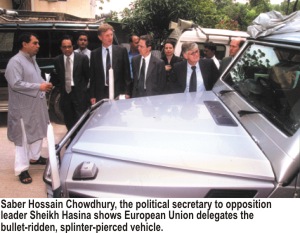 As
for the judicial enquiry commission, the one-man probe body
manned by justice Md Joynul Abedin started its work, collecting
eyewitness accounts. By September 2, the last day for enlistment,
the commission recorded 17 people as witness to the blasts.
These witnesses were asked to come forward to its office at
2/A Circuit House Road, Kakrail to record their statements. As
for the judicial enquiry commission, the one-man probe body
manned by justice Md Joynul Abedin started its work, collecting
eyewitness accounts. By September 2, the last day for enlistment,
the commission recorded 17 people as witness to the blasts.
These witnesses were asked to come forward to its office at
2/A Circuit House Road, Kakrail to record their statements.
Equating
global terrorism with the series of bomb blasts in Bangladesh
has a detrimental side to it. According to Farhad Mazhar it
is a pretext for the US to find its way into Bangladesh, which
is a strategically important country in the political map.
"In the present geo-political context and with the growing
friendship of China with Myanmar and its move to build a sea-port
in Coco island for the Myanmar navy, the US as well as India
have much to worry about," says Sakhawat Hussain. He
also believes that fighting terrorism in Bangladesh is linked
with the war against global terrorism. Hussain firmly believes,
"It has outside connections."
Hussain
also stresses, "By now we could also have a civil intelligence
cell to collect data and to do research on the series of bombing.
Since we have already aligned ourselves with countries that
waged the war against terrorism, we could have developed some
expertise on that line."
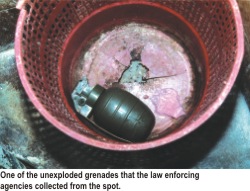 But,
at the home front, no such luck awaits us. Even a cursory
look at our intelligence outfits bound to raise an alarm.
All three agencies are ailed by problems regarding logistics
as well as inadequate work force. The Central Intelligence
Department CID comprising 500 staff members, has about 150
positions vacant. Apart from lacking in technology, they also
have to deal with nitty gritties like not having enough vehicles
or even phone lines. An official said to a reporter that the
department has about 50 investigators, but they often do not
get the required vehicle during investigation. "We sometimes
go to spots to investigate without the necessary back up,
which is risky," he adds. But,
at the home front, no such luck awaits us. Even a cursory
look at our intelligence outfits bound to raise an alarm.
All three agencies are ailed by problems regarding logistics
as well as inadequate work force. The Central Intelligence
Department CID comprising 500 staff members, has about 150
positions vacant. Apart from lacking in technology, they also
have to deal with nitty gritties like not having enough vehicles
or even phone lines. An official said to a reporter that the
department has about 50 investigators, but they often do not
get the required vehicle during investigation. "We sometimes
go to spots to investigate without the necessary back up,
which is risky," he adds.
CID is
a neglected department. Even the position of the department
chief, generally an additional inspector general, remains
vacant to this days.
Both the
Detective and Special Branch are facing similar problems.
Of the 2268 positions of the Special Branch (SB), 1000 are
vacant. The DB is the agency that is supposed to warn the
other agencies of any bomb attack but they utterly failed
in doing so.
Now, in
the face of repeated failure to solve past bomb blasts cases
and the ongoing investigation on August 21, the chief of Special
Branch has said that the authorities concerned are thinking
of developing the detective agencies as specialised force.
At last the authorities are thinking of modern forensic installation,
video recording teams and modern telecommunication systems.
Will this lead to a complete overhaul of the intelligence
agencies in Bangladesh? Will this confirm that these agencies
would be allowed to pursue the cases without intervention
from the high-ups? These are the questions that overshadow
the future of all investigations including the grenade attack
on the AL rally on August 21.
Copyright
(R) thedailystar.net 2004
|
